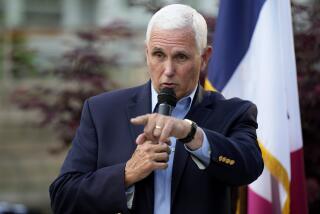Du Pont Tells Presidency Bid, Assails Drugs
- Share via
WILMINGTON, Del. — Former Republican Gov. Pierre S. (Pete) du Pont IV of Delaware announced his candidacy for the GOP presidential nomination Tuesday and called for mandatory drug testing of the nation’s teen-agers, saying he would withhold federal aid from school districts that refused to go along.
The first in a long line of presidential hopefuls in both parties who are expected to formally declare 1988 ambitions, the 51-year-old Du Pont also is the latest politician to respond to growing public concern about the use of drugs.
Du Pont’s drug-testing plan was only one of a series of specific proposals offered in his announcement speech dealing with various national concerns, including welfare, agriculture and education. But it probably was the most provocative idea and the one most likely to call much-needed attention to his long-shot bid for the White House.
Referring approvingly to the “Rambo-like crusade” against drugs now being promoted by Congress and the White House, Du Pont told about 500 friends and supporters in a hotel ballroom here: “The one place kids should be safe from drugs is in the classroom. But the only way we’ll ever guarantee drug-free classrooms is comprehensive testing of teen-agers in our schools.
“If we can require vaccinations before kids go to school,” he added, “we can require drug testing while they’re in school.”
While acknowledging the need for counseling for young people tempted by drugs, Du Pont stressed the need for penalties to discourage use. “We have to say: ‘If you use drugs you won’t drive. Because you won’t have a driver’s license.’ ”
Federal Aid as Lever
When asked after his speech how he would get school districts to join in the testing plan, Du Pont told a reporter: “You’d use the (federal) school aid lever.”
As part of his effort to convince his fellow Republicans that he is the most logical choice to continue and expand President Reagan’s conservative doctrines, Du Pont offered proposals in the following areas during a 30-minute speech frequently interrupted by applause:
--Education. He suggested giving tuition vouchers to poor families so that they could have greater choice on where their children go to school and establishing a national job-training program in which tuition would be paid by government-guaranteed loans.
--Welfare. “If you don’t work, you don’t get paid” would be the policy of President Du Pont. Those unable to find jobs in the private sector would have to take government jobs at 90% of the minimum wage, plus free day care.
--Agriculture. Calling government support programs “a trap for the farmer and a fleecing of the taxpayer,” Du Pont would phase out federal “price-fixing schemes” over the next five years. During the transition period, government would make payments directly to the farmer.
The Harvard- and Princeton-educated Du Pont left a job as quality control engineer in his family’s corporate empire in 1969 to run successfully for the Delaware Legislature and then Congress, where in three terms he gained a reputation as a centrist.
But as governor of Delaware from 1977 to 1985, Du Pont seemed to shift to the right, particularly on economic policy. He pushed through sharp tax cuts that he claims spurred the state’s economy.
From a small state and relatively unknown nationally, Du Pont starts his presidential drive facing considerable handicaps. But he has worked hard to help strengthen his party at the state level around the country. And the grass-roots contacts he has made in the process probably will stand him in good stead if Vice President George Bush, the front-runner in the 1988 GOP nomination race, should falter.
Du Pont left immediately after his speech for three days of campaigning in New Hampshire.
More to Read
Get the L.A. Times Politics newsletter
Deeply reported insights into legislation, politics and policy from Sacramento, Washington and beyond. In your inbox twice per week.
You may occasionally receive promotional content from the Los Angeles Times.










